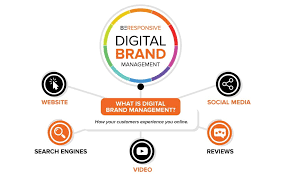The Power of Digital Brand Marketing
In today’s fast-paced digital landscape, establishing a strong brand presence online is more important than ever. Digital brand marketing plays a crucial role in shaping how customers perceive and interact with a business in the virtual world.
Building Brand Awareness
Digital brand marketing encompasses various strategies aimed at increasing brand awareness among target audiences. Through social media campaigns, content marketing, search engine optimisation (SEO), and email marketing, businesses can reach a wider audience and create lasting impressions.
Creating Brand Loyalty
Engaging with customers through digital channels allows brands to build relationships and foster loyalty. By providing valuable content, personalised interactions, and exceptional customer service online, businesses can establish trust and loyalty that extends beyond transactions.
Driving Conversions
Effective digital brand marketing not only enhances visibility but also drives conversions. By crafting compelling calls-to-action, optimising user experience on websites and landing pages, and leveraging data analytics to refine strategies, brands can convert leads into loyal customers.
Adapting to Trends
The digital landscape is constantly evolving, with new technologies and trends emerging regularly. Successful digital brand marketing involves staying agile and adapting strategies to align with the latest trends, platforms, and consumer behaviours to remain relevant and competitive.
Measuring Success
An essential aspect of digital brand marketing is measuring success through key performance indicators (KPIs) such as website traffic, engagement rates, conversion rates, and return on investment (ROI). By analysing data and metrics, brands can refine their strategies for optimal results.
Conclusion
Digital brand marketing is an indispensable tool for businesses looking to thrive in the digital age. By strategically positioning their brands online, engaging with audiences authentically, and continuously refining their approaches based on data-driven insights, businesses can build strong brand identities that resonate with consumers in the ever-evolving digital landscape.
Essential FAQs on Digital Brand Marketing: Importance, Strategies, and Best Practices
- What is digital brand marketing and why is it important?
- How can social media be leveraged for digital brand marketing?
- What role does content marketing play in digital brand marketing strategies?
- How can businesses measure the effectiveness of their digital brand marketing efforts?
- What are some common trends and best practices in digital brand marketing?
What is digital brand marketing and why is it important?
Digital brand marketing refers to the strategic use of digital channels and platforms to promote and enhance a brand’s presence online. It encompasses various tactics such as social media marketing, content creation, SEO, email campaigns, and more to engage with target audiences and build brand awareness. Digital brand marketing is crucial in today’s digital age as it allows businesses to connect with their customers in real-time, create meaningful interactions, and establish a distinct identity in a competitive marketplace. By leveraging digital tools and technologies effectively, brands can strengthen customer loyalty, drive conversions, and ultimately differentiate themselves from competitors in the ever-evolving digital landscape.
How can social media be leveraged for digital brand marketing?
Social media serves as a powerful tool for digital brand marketing by offering businesses a platform to engage with their target audience on a personal level. Through strategic content creation, targeted advertising, and community building, businesses can leverage social media to increase brand visibility, drive website traffic, and foster meaningful relationships with customers. By understanding the preferences and behaviours of their audience on various social media platforms, businesses can tailor their messaging to resonate with users effectively, ultimately strengthening brand identity and loyalty in the digital realm.
What role does content marketing play in digital brand marketing strategies?
Content marketing plays a pivotal role in digital brand marketing strategies by serving as a cornerstone for engaging and connecting with target audiences. Through compelling and relevant content, businesses can establish their expertise, build credibility, and foster relationships with customers. Content marketing helps drive brand visibility, attract organic traffic, and differentiate brands in a crowded digital space. By creating valuable content that resonates with their audience’s needs and interests, businesses can enhance brand awareness, nurture leads, and ultimately drive conversions. In essence, content marketing is instrumental in shaping the perception of a brand online and cultivating long-lasting relationships with customers.
How can businesses measure the effectiveness of their digital brand marketing efforts?
Businesses can measure the effectiveness of their digital brand marketing efforts through a range of key performance indicators (KPIs) that provide valuable insights into the impact of their strategies. Metrics such as website traffic, social media engagement, conversion rates, customer acquisition costs, and return on investment (ROI) offer tangible data points to assess the success of digital campaigns. By analysing these KPIs, businesses can gain a comprehensive understanding of how their brand is performing online, identify areas for improvement, and make informed decisions to optimise their digital marketing efforts for greater impact and long-term success.
What are some common trends and best practices in digital brand marketing?
In the realm of digital brand marketing, staying abreast of common trends and best practices is paramount to achieving success in an increasingly competitive landscape. Some prevalent trends include the rise of influencer marketing, the importance of creating authentic and engaging content, the growing significance of video marketing, and the emphasis on personalisation to enhance customer experiences. Best practices often involve leveraging data analytics to inform strategy decisions, prioritising mobile optimization for seamless user experiences, integrating social media across all touchpoints, and maintaining a consistent brand voice and identity across platforms. By embracing these trends and implementing best practices, businesses can effectively navigate the digital sphere and connect with their target audiences in meaningful ways.

